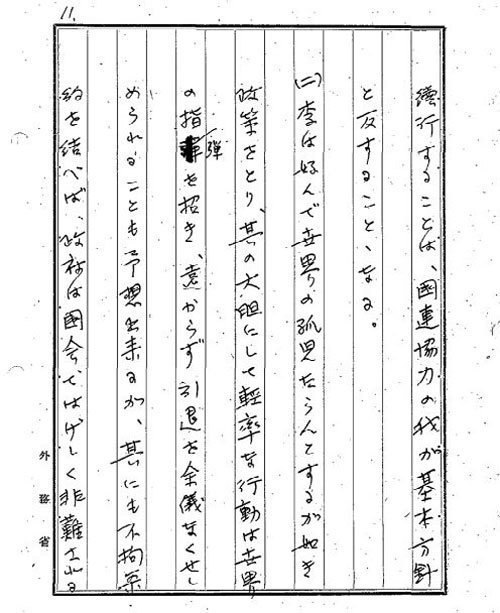Kubota’s remarks confirmed to end 1953 S. Korea-Japan talks
Kubota’s remarks confirmed to end 1953 S. Korea-Japan talks
Posted February. 11, 2022 07:36,
Updated February. 11, 2022 07:36

Kubota’s remarks, which led to the rupture of the third South Korea-Japan talks in 1953, have been confirmed to be an intentional strategy by the Japanese government exploiting setbacks in the South Korea-U.S. relationship.
According to the “Detailed Catalogue of South Korea-Japan Talks and Japanese Diplomatic Documents” recently published by the Northeast Asian History Foundation, chief Japanese delegate Kanichiro Kubota wrote a document calling for an intentional delay of the third South Korea-Japan talks on June 21, 1953. Following the document, he said Japan’s control of Korea was a grace offered to Korean people at the South Korea-Japan talks in October 1953, which led to the suspension of bilateral talks for five years.
In the 16-page document, Kubota emphasized that the South Korean government was on the defensive following former President Rhee Syngman‘s release of anti-communist prisoners of war on Geoje Island in 1953. “The Rhee administration released 25,000 North Korean prisoners of war, taking an opposite stance against the U.N. Rhee will have to resign soon for the criticism against his policy that will make South Korea isolated from the rest of the world,” the Japanese delegate wrote. “The acceleration of talks with Rhee who will soon collapse should be reconsidered.”
The Rhee administration unilaterally released anti-communist prisoners of war from the Geoje Island prison camp on June 18, 1953, which strained a relationship between South Korea and the U.S. The Japanese government had a strategy to indefinitely postpone the talks using this as an excuse.
The document is part of 60,000-page diplomatic documents on South Korea-Japan talks that have been released by the Japanese government for 10 years since 2007. For the initial release in 2007, the Japanese government disclosed redacted versions hiding critical information. After continuous trials for information disclosure by Japanese civic groups, some of the originals were additionally released.
“While the Japanese government said Kubota’s remarks were his own opinion, it turned out with the document that it was indeed the Japanese government’s strategy to indefinitely postpone the talks by putting the blame on South Korea for the end of the talks,” said Jo Yoon-su, a researcher at the Northeast Asian History Foundation. “The Japanese government carefully analyzed South Korea’s situation in the international community and exploited it.”
always99@donga.com







